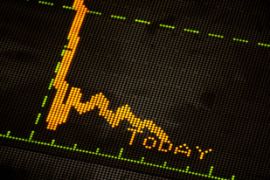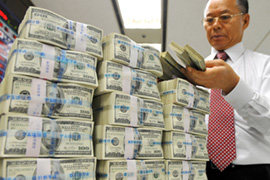Markets tumble amid renewed fears
Banking stocks plunge as European markets slide back into red after brief recovery.

As European leaders met in Luxembourg on Tuesday to address the crisis, Iceland nationalised Landsbanki, its second-largest bank, and held talks to secure a $4bn loan from Russia to prop up the Scandinavian country’s finances.
Iceland on Monday suspended trading of shares in its major banks, while the kroner lost about 30 per cent of its value against the euro.
Banks hit
The biggest fallers in trading on Tuesday were banking institutions.
In London, Royal Bank of Scotland (RBS), Britain’s second biggest bank, saw its share price collapse fall by almost 40 per cent to a low of 90 pence per share.
The loss came after a rumour surfaced that RBS and its rival Barclays are to receive $45bn in British government assistance.
“London, Frankfurt and Paris this morning were all showing a two per cent gain and everybody felt very good about themselves,” David Buik, from the London brokerage firm BGC Partners, told Al Jazeera.
 |
| Shares in RBS have sunk amid speculation of government assistance to the bank [AFP] |
“Then what I could only describe as a disgraceful leak, either from the treasury or someone from the government or some malicious person suggesting that (British finance minister) Alastair Darling was talking to the Royal Bank of Scotland and to Barclays with regard to a $45bn assistance – this is just sort of thing that just sends markets into turmoil.”
“If the government had some announcement to make about shoring up the balance sheet of Bank of Scotland or Barclays, then by all means do so. But not piecemeal; leaving us all dripping and hanging us out to dry.”
Shares in Commerzbank, Germany’s second biggest bank, dropped by 16.72 per cent, while number one Deutsche Bank was off by 12.99 per cent.
Asian stocks plunged again on Tuesday as fear-stricken investors saw no end in sight to the crisis, with Tokyo sliding 3.03 per cent to a near five-year low.
Investors remained nervous, although a hefty cut in Australian interest rates brought some relief to Asian markets.
The Reserve Bank of Australia cut rates by a full percentage point, double the amount that was expected and the biggest rate cut since 1992.
The Bank of Japan (BOJ) also injected 1 trillion yen ($9.8bn) into money markets – the 15th straight business day that the Japanese central bank has poured money into the short-term money market as part of efforts by the world’s central banks to ensure a flow of cash vital to the financial system.
But fund injections by central banks have so far been largely ineffective, as have individual government plans to bail out failing financial institutions in the US and Europe.
G7 meeting
 |
|
Fund injections by central banks have so far failed to calm markets or spur lending [AFP] |
Ashley Davies, a currency strategist with UBS in Singapore, told the Reuters news agency that “the key issue is co-ordination of policies, since individual country policies aimed at shoring up confidence of domestic institutions can actually exacerbate systemic risk by altering relative risk between countries”.
Speculation that the Group of Seven (G7) industrialised nations meeting in Washington this week would agree on a co-ordinated response – including rate cuts – to the financial turmoil also helped Wall Street erase some of its biggest intraday losses on record on Monday.
The Dow Jones industrial average had fallen 700 points at one stage on Monday but clawed back to close down 369.88 points, or 3.58 per cent, to 9,955.50, still the first time since October 2004 that the Dow has closed below 10,000 points.
The banking upheaval that began on Wall Street has in effect shut down interbank and other loan markets.